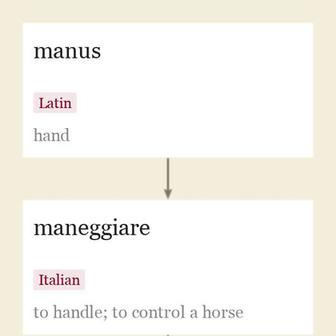management (n.)
1590年代,“通过指导或操纵进行管理的行为”,源自 manage 和 -ment。 “通过物理操纵进行管理的行为”意义始于1670年代。 “治理机构,共同经营的管理者”(最初是指剧院)始于1739年。
management 的相关词汇

1560年代,“处理、训练或指导”(马匹),源自现已废弃的名词 manage“处理或训练马匹; 马术”(见 manege,这是它的现代复兴),源自古法语 manège“马术”,源自意大利语 maneggio,源自 maneggiare “处理、触摸”,尤其是“控制马匹”,最终源自拉丁语名词 manus “手”(来自 PIE 根 *man-(2)“手”)。
“通过行政能力控制或指导任何业务”的扩展意义始于1570年代; “手持(工具或物品)使用”意义始于1580年代。“通过努力实现”(因此“成功完成”)的意义始于1732年。1650年代建议使用“获得、处理事务”的不及物意义,在19世纪中期经常使用。相关: Managed; managing。1933年使用了 Managed economy。
Manage literally implies handling, and hence primarily belongs to smaller concerns, on which one may at all times keep his hand: as, to manage a house; to manage a theater. Its essential idea is that of constant attention to details: as, only a combination of great abilities with a genius for industry can manage the affairs of an empire. [Century Dictionary]
Manage 字面上意味着处理,因此主要适用于较小的问题,可以随时掌握:如, manage 一所房子; manage 一座剧院。其基本思想是对细节的持续关注:如,只有伟大的能力与工业天才的结合才能 manage 一个帝国的事务。[世纪词典]
这是一个拉丁语常见后缀,最初来自法语,代表拉丁语 -mentum,它被添加到动词词干中,以制造表示动词行为结果或产品,或动词行为的手段或工具的名词。在俗语拉丁语和古法语中,它被用作动作名词的形成成分。法语在动词根和后缀之间插入一个 -e-(例如从 commenc-er 形成的 commenc-e-ment; 对于以 ir 结尾的动词,插入 -i-(例如从 sentir 形成的 sent-i-ment)。
从16世纪开始,与英语动词词干一起使用(例如 amazement, betterment, merriment,最后一个还说明了在这个后缀之前将 -y 变成 -i- 的习惯)。
The stems to which -ment is normally appended are those of verbs; freaks like oddment & funniment should not be made a precedent of; they are themselves due to misconception of merriment, which is not from the adjective, but from an obsolete verb merry to rejoice. [Fowler]
通常附加 -ment 的词干是动词的词干; 像 oddment 和 funniment 这样的怪异词不应成为先例; 它们本身是由于对 merriment 的误解而产生的,后者不是来自形容词,而是来自一个过时的动词 merry,意为“欢乐”。[福勒]
"不小心或不当的管理",1660年代; 见 mis-(1)"坏的,错误的" + management。